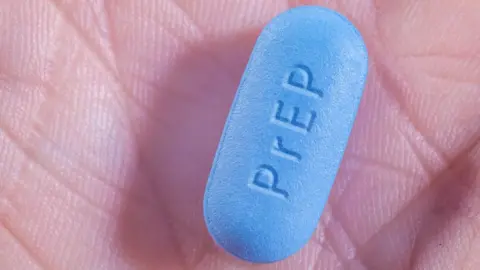Pre-sex HIV drug 'no-brainer' for NHS
 Getty Images
Getty ImagesA drug to dramatically cut the risk of HIV infection during sex would save the UK around £1bn over the next 80 years, say scientists.
The team at University College London says Prep, or pre-exposure prophylaxis, is a "no-brainer" for the NHS.
The study predicts that giving Prep to men who have sex with men would prevent one in four HIV cases.
NHS England is currently funding a trial of Prep in 10,000 patients, but does not offer the treatment routinely.
Prep is already available in Scotland. The health service in England fought against paying for Prep in the courts, but agreed to trialling it in selected clinics.
Preventive pills
Prep disables HIV before it gets a stranglehold in the body and trials show it can cut the risk of being infected by up to 86%.
The financial analysis, published in the Lancet Infectious Diseases, looked at the cost-effectiveness of a national roll-out of Prep, focusing on the highest risk group - men who have sex with men.
It showed offering Prep would cost the NHS money initially as it paid for both Prep and lifelong care for people already infected with HIV.
It could take up to 40 years to become cost-effective, when savings from the falling number of new HIV cases equal the cost of Prep.
Eventually, after 80 years, the pills would deliver a saving of £1bn, say the researchers.
Dr Alison Rodger, part of the UCL team, told the BBC: "Not only is it a highly effective treatment, it will save money. It's a no-brainer so it's a good thing to do."
 Getty Images
Getty ImagesThe researchers' mathematical model predicted:
- In the first year Prep was available, 4,000 men would start taking it, rising to 40,000 within 15 years
- Men would take Prep for 4.5 years on average
- Men would take two pills before sex, followed by one-a-day until they had gone two days without condom-less sex
- Men would average five pills a week
It is still cost-effective with a daily Prep pill, but it takes longer to become cost-effective. Both options are being investigated as part of the NHS England trial.
The other major unknown is the long-term cost of the drugs, which may fall as cheaper alternatives become available.
Dr Michael Brady, medical director at the Terrence Higgins Trust, said: "It is important that all who need Prep can access it, and evidence like this reinforces the need for Prep to be fully commissioned and given a long-term, sustainable home on the NHS in England."
Dr Paul Revill, from the centre of health economics at the University of York, said the NHS needed to be "far sighted [and] invest now and reap long-term gains".
He added: "With a combination of frequent HIV testing, immediate treatment, and Prep availability, there is now the prospect of bending the curve of new HIV infections downwards in a way that did not seem feasible just a few years ago."
A spokesperson for NHS England said: "The Lancet study makes an important contribution to the growing evidence for cost effectiveness of Prep, highlighting the factors which will determine this, such as price and duration on Prep."
Follow James on Twitter.
